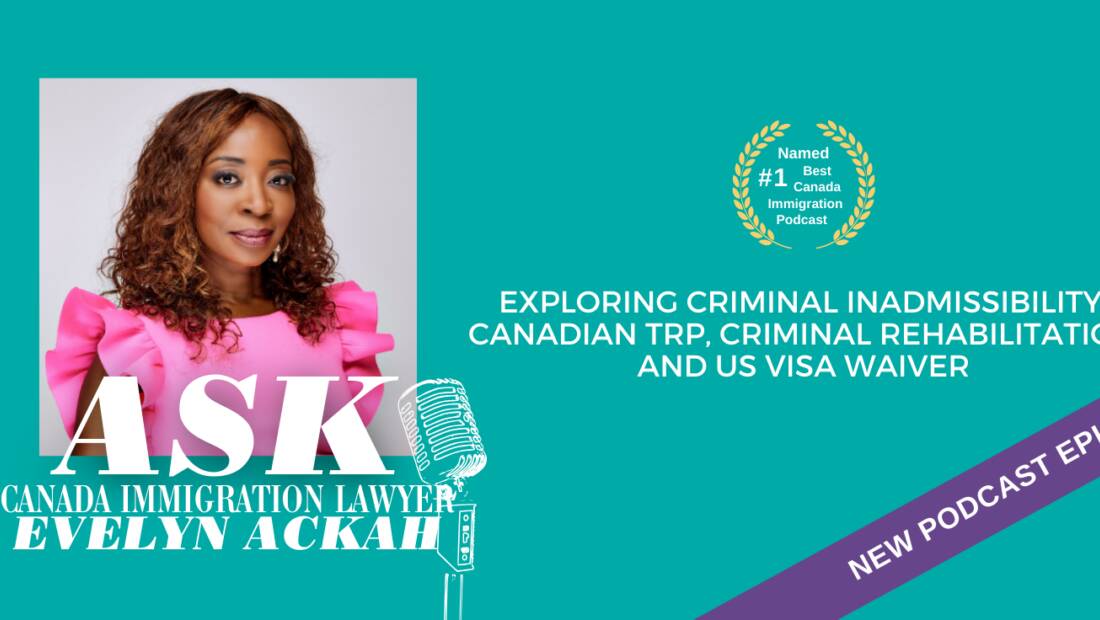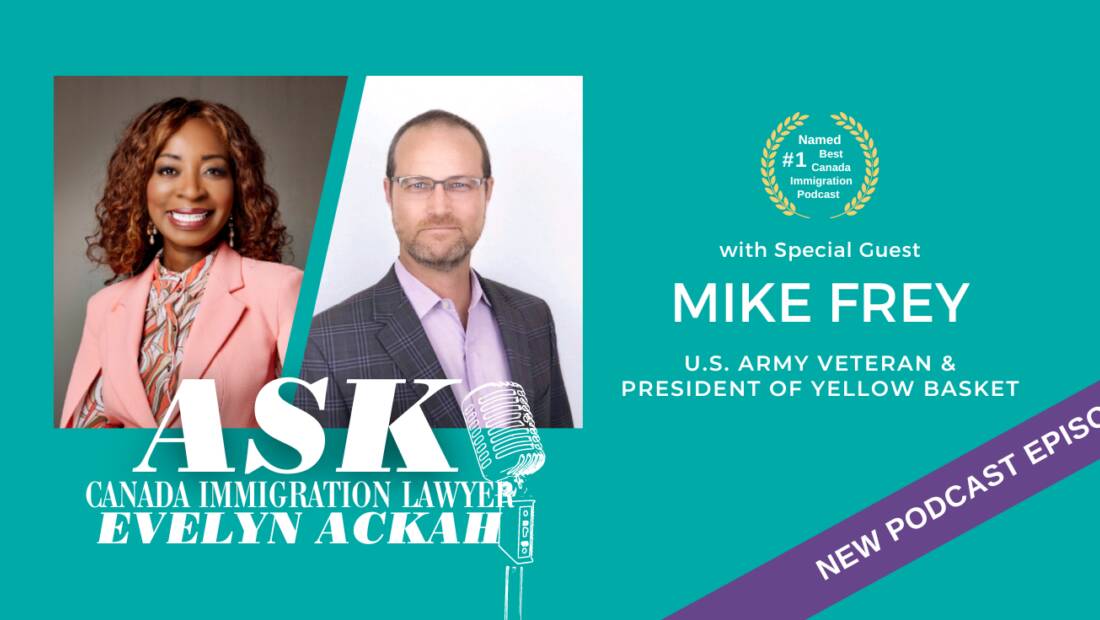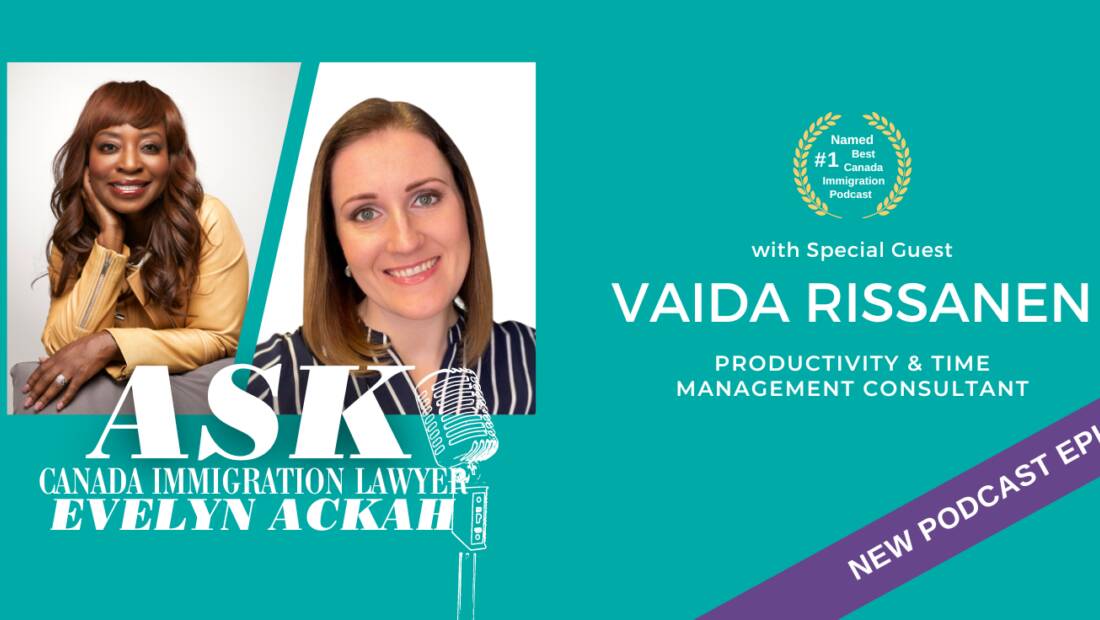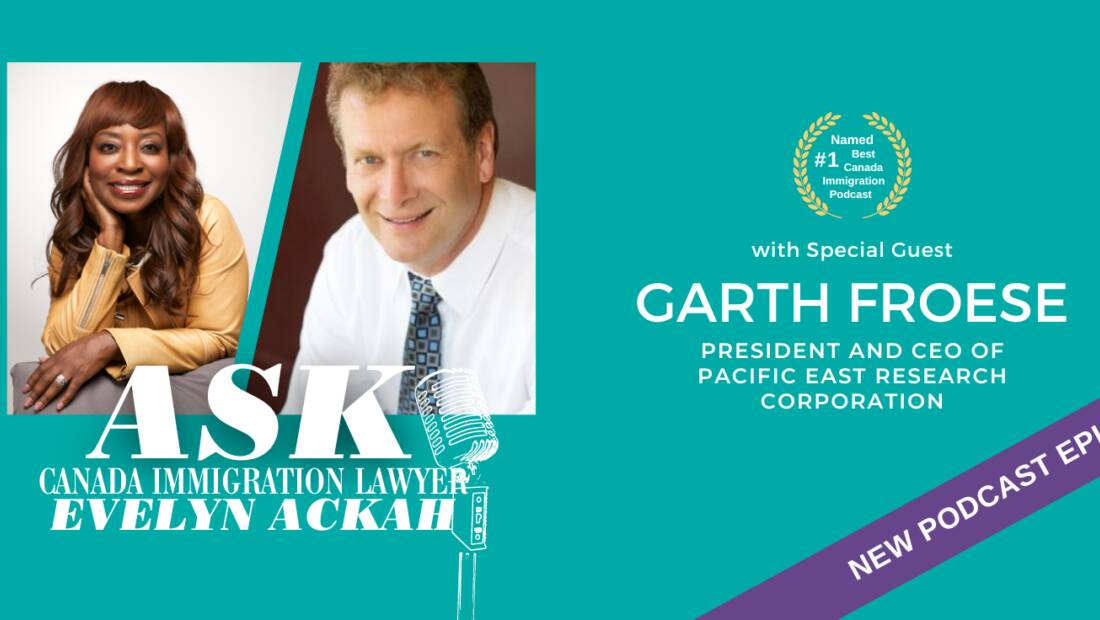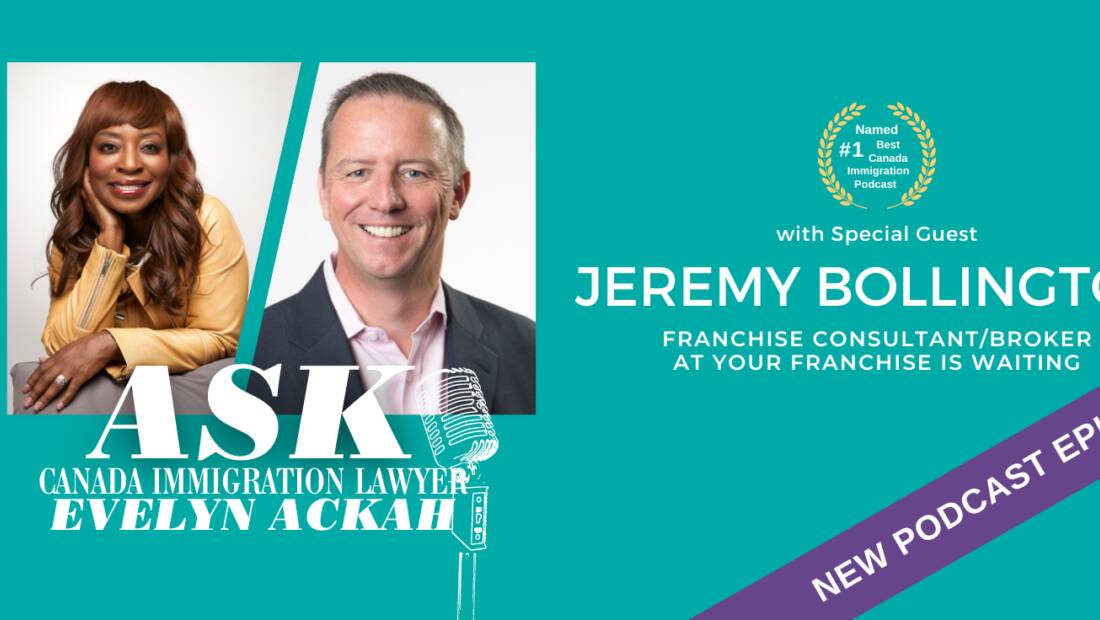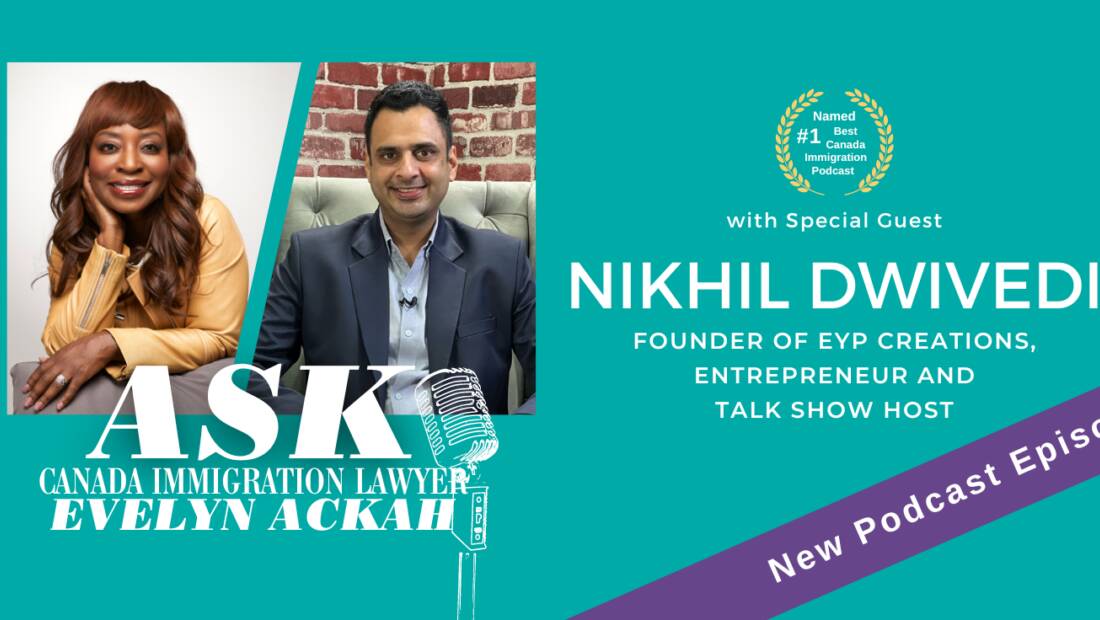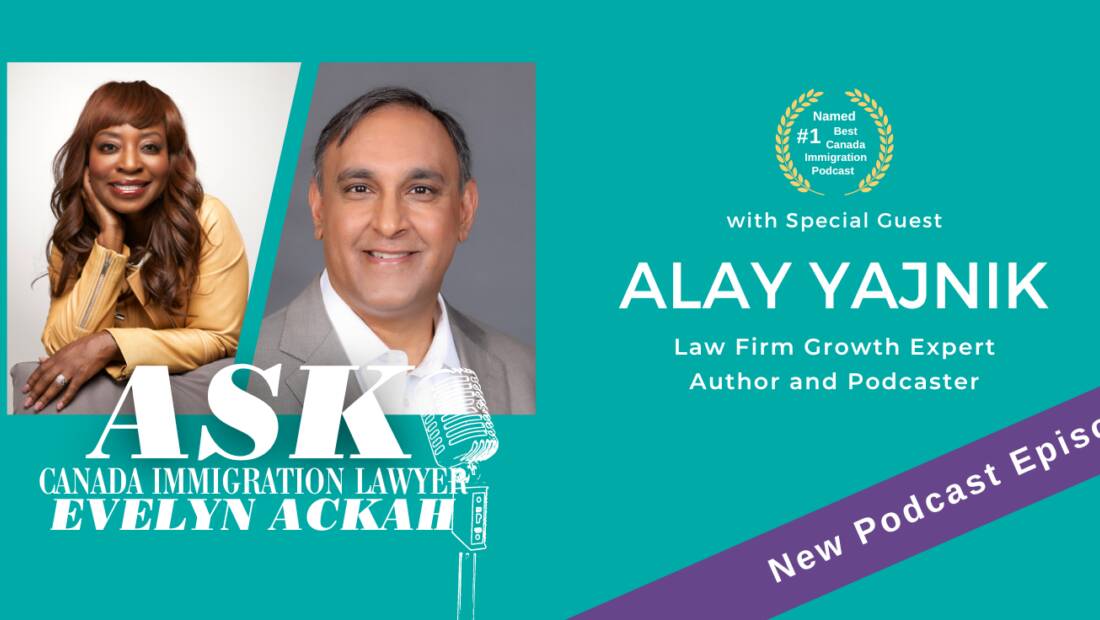Or listen on your favourite podcast app
On the Ask Canada Immigration Lawyer Evelyn Ackah podcast, host Evelyn Ackah is doing a solo deep dive into the world of criminal inadmissibility. In this episode, Evelyn dives into the complexities of criminal inadmissibility when crossing borders into Canada and the U.S. She covers everything you need to know about Temporary Resident Permits (TRP) for Canada, Criminal Rehabilitation, and U.S. Visa Waivers. Whether you or a loved one have a past conviction or you're an immigration professional seeking to better understand these options, this episode breaks down each process. Join Evelyn as she discusses how to overcome criminal inadmissibility and how to navigate these legal pathways to ensure a smooth border-crossing experience. The podcast concludes with Evelyn sharing practical pointers for crossing the boarder seamlessly.
BOOK YOUR FREE INITIAL CALL
Here are the key points from Evelyn Ackah's podcast:
- Background:
- Evelyn Ackah introduces what criminal inadmissibility is; it applies to people who are not allowed to enter or stay in Canada or the United States because they have committed or been convicted of a crime.
- She shares an example of criminal inadmissibility.
- Implications of Crminal Inadmissibility:
- She shares how criminal inadmissibility stops are becoming more frequent as government entities share information electronically.
- Criminal inadmissibility really affects your ability to work if you are required to travel cross-border, such as business meetings or attending conferences or trade conventions. It also affects your personal life if you are trying to travel for family trips, family reunions, or anything like that.
- Evelyn discusses the types of crimes that may cause immigration issues that will lead to denial
- Canadian Temporary Resident Permits:
- Evelyn shares how important applying for a TRP, even if you are a US citizen.
- The TRP process takes anywhere from three to six months for the Canadian consulate to make a decision as to the risk and and the benefits of letting you enter Canada.
- In terms of how to apply for a temporary resident permit, we always recommend working with a professional; please hire a lawyer who's licensed, with good reviews, and has a good reputation. If you have criminality, your ETA will be refused, and then you will have to determine what you want to do next after that.
- Temporary resident permits are usually issued for brief durations of time, anywhere from one-time entry for 30 days, if you're coming for one specific thing like a conference, up to maybe getting a year or two even, if there's a reason to show you need to keep coming into Canada.
- Criminal Rehabilitation:
- Evelyn shares that if you are convicted of a crime outside of Canada, then you need to figure out if you qualify for criminal rehabilitation.
- She shares about this option and how it is available to overcome your criminal inadmissibility depending on when and where crime was committed and the severity of the crime.
- She shared the types of criminal rehabilitation and discussed the differences between the types, such as deemed rehabilitation.
- US Visa Waivers:
- Evelyn shares that if you have any previous criminality before you travel to the US, you need to apply for and obtain a US Entry Waiver from the Department of Homeland Security; this waiver allows citizens with a criminal conviction or other issues that are visa exempt to apply for ent entry special entry.
- She shares just how extensive the paperwork is for a US visa waiver. The paperwork includes proof of citizenship, fingerprints, biometric or biographic information forms, police records, court documents, character reference letters, rehabilitation documents, personal statements, and a lot of information to be able to get you that approval.
- Evelyn explains how important it is to work with a legal professional on this paperwork because if one thing is missed, the visa waiver will come back refused; plus the processing time is anywhere from three to eight months to get a US visa waiver.
- Practical Pointers for Crossing the Border:
- Evelyn shares that you should always hire a legal professional if you have any criminality on your record, so that you do not receive a refusal.
- She shares that if you do plan to apply for anything related to criminal inadmissibility, it takes time. A TRP or a US Visa Waiver, to apply early as the processes can take anywhere from three to eight months and Criminal Rehabilitation can take up to two years.
- You need to watch out for ineligibility due to criminal convictions or prior refusals. Sometimes people don't even have a criminal record, but they had a problem at the border and they were determined to be inadmissible.
About Calgary Immigration Lawyer Evelyn Ackah
Evelyn Ackah is the Founder and Managing Lawyer at Ackah Business Immigration Law. With offices in Calgary, Toronto and Vancouver, we work with individuals and business owners from all over the world who want to cross borders seamlessly. For more information on immigration to Canada or the United States, Ask Evelyn Ackah at Ackah Business Immigration Law today at (587) 854‑3821 or email Evelyn directly at contact@ackahlaw.com.
The Ask Canada Immigration Lawyer Evelyn Ackah podcast, hosted by Calgary Immigration Lawyer Evelyn Ackah, was named the #1 Best Canada Immigration Podcast in 2023 by Feedspot.
BOOK YOUR FREE CALL WITH OUR INTAKE TEAM
[00:00:00] Evelyn Ackah: Hi, today we are talking about exploring criminal inadmissibility, Canadian temporary resident permits, criminal rehabilitation and US visa waivers. It's a topic that gets a lot of attention. I do a lot of consultations on it because it affects everybody that has had something in their past that is now impacting their ability to enter the United States or Canada for business or for pleasure in tourism.
[00:00:28] I'm really excited to have you here and I hope that you'll enjoy the information I'm sharing. And if you have any questions at all, feel free to reach out after the webinar and we'd be happy to help you with that. Okay, let's get started. What is criminal inadmissibility? I want to go through this because oftentimes people don't understand what it is. If you have ever traveled to the United States, let's say, and you get pulled into secondary,
[00:00:56] And the CBP officer looks up your file and says, Oh, I see something here. Um, from when you were 19, you had a marijuana conviction in Canada. I can't let you in. They're basically telling you, you are now inadmissible to the United States unless you get a visa waiver. I recently had a consultation with a very senior executive and he had been traveling to the U S no problems for years and years. And then in 2022,
[00:01:24] He was going to Hawaii with his family and he was stopped and he was told, you cannot go in. You need to get a visa waiver because you did something, you know, when you're in your early twenties and you have a conviction. And even if you got a pardon.
[00:01:40] from Canada, they don't recognize it and he could not go on the family trip. It was pretty devastating, embarrassing, um really, really stressful because that is a process that takes hours for them to decide and then you have to be turned back. So I want to make sure you understand what criminal inadmissibility is. It applies to people who are not allowed to enter or stay in Canada or the United States because they have committed or been convicted of a crime.
[00:02:09] And that crime may have occurred either in Canada or outside of Canada, the United States, in Mexico, or anywhere else in the world that somehow is popping up on the immigration's website. That means that they can never enter without getting some clearance. They are considered unsuitable for entry as both a visitor or a worker or even permanent resident because of their criminal history.
[00:02:35] What are the implications of criminal inadmissibility? So before I even get through this deck, one time I had a client that was just charged with something and already what's happening and why things are happening more and more frequently is because Canada and the US police and RCMP and FBI, they're sharing more information electronically. Years ago when I started doing this, it wasn't that easy for people to even be determined to be inadmissible because there was no electronic sharing of information.
[00:03:04] Now, um I'm having people who even have been charged and not convicted, they need to travel for business and they're not able to travel, and they get stopped. Even if they haven't been found guilty, they're being stopped because there is already a charge that has been processed by the Canadian police officials and therefore they're inadmissible until it gets cleared up.
[00:03:28] So the implications of criminal inadmissibility are that it really affects your ability to work if you're required to travel for business, cross border. If you're required to go on family trips, family reunions, anything like that, even for business meetings, for sales or attending conferences and trade conventions, you cannot enter because they have determined that you are inadmissible. So criminal inadmissibility can arise from a wide array of offenses, including serious crimes and those involving dishonesty and jeopardizing public welfare. Assessing an admissibility requires a thorough review of the nature and the gravity of the offenses. The Canadian immigration system prioritizes our safety here in Canada so that if somebody is seen to be a detriment, they won't let them into Canada if it's going to create problems for the Canadian public.
[00:04:23] So for instance, there's the difference between somebody who may have a DUI or somebody who did some cannabis when they're 19 or 20 years old versus somebody who is charged with assault, sexual assault, or driving under the influence causing bodily death or harm. Those are different kinds of levels.
[00:04:44] of criminality and at Accolaw we have to review the law in the state and the city and that it occurred and then we have to equate it to the Canadian law that's equivalent so we can determine how serious that charge and conviction is. Another thing to think about is how does a criminal record affect eligibility for a Canadian visa? If you have a criminal record Canada has strict policies that if you have a criminal record they may not allow you in and it will definitely influence your visa application. Even now that many countries who are coming to Canada, citizens of these countries require what's called an electronic travel authorization. That process is already a screening process to find out if you have any criminality at all and
[00:05:31] what it is so that the government can decide if they're going to let you have your electronic travel authorization or not. So that's another method of of determining who is considered inadmissible. When reviewing even visa applications, for instance, Mexicans who now need visas to come even as visitors, Canadian immigration officials examine the applicant's background to evaluate potential risks linked to criminal activities. While applicants with criminal records might still qualify for a visa,
[00:06:00] They frequently need to submit more information and more paperwork to prove to the officials that they are not a risk to Canada. And this is one of the things that we help you with. We need to ensure that we can prove rehabilitation and prove that you've done everything right to fix your situation. The three types of crimes that may cause immigration issues that will lead to denial, the types of crimes that may cause immigration issues for you are those that are committed when you were um
[00:06:31] 18 or over that also are seen as serious. So even though people think maybe it was under 18, I stole a car. If it was treated as a juvenile offense, it may not show up at all on your criminal record and may not make you inadmissible. But you cannot assume that something you did when you're under 18 won't impact your in ah your a level of admissibility to Canada or the United States.
[00:06:57] So to assess whether or not your criminal charge might make you inadmissible, you need to understand the different types of convictions recognized in Canada. This is a list of the types of crimes that may cause immigration issues for you. We do this work every day. It is very common. I always tell people, you shouldn't be embarrassed. You know, it is something that has happened. I've had it with grandmothers, had it with senior executives and professionals, artists,
[00:07:23] sports athletes. It is the reality that people make mistakes and then their lives change. I've had it with doctors. The range of crimes that can make individuals inadmissible is extensive, including various activities that threaten public safety, national security, or fundamental principles of justice. This list is just a sample Everything, as I've mentioned before, from driving under the influence of drugs or alcohol, drug possession or distribution, organized crime, smuggling people, money laundering, theft, breaking and entry, arson, counterfeiting, motor vehicle offenses causing theft, espionage, and on and on and on. Obviously, the most serious ones, terrorism, espionage, et cetera, those are clear, war crimes, and you know et cetera. But people don't think sometimes that
[00:08:11] something that they did when they were young should still affect them because now they're an upstanding citizen. And you need to understand that there are levels and shades of what the government considers to be significant in terms of the risk to Canadians. So if you have a criminal record and you want to come to Canada, the only way that's going to happen, especially given maybe how frequent or recent it was, if it was a year or two ago,
[00:08:36] there's definitely no way that you can enter easily. You need to apply for a temporary resident permit. And in order to make it truly go away, you may need to apply for criminal rehabilitation if you're eligible after five or 10 years has gone by. And that depends on the seriousness of the offense. So we're going to focus now on the TRP, the temporary resident permit. Um, I recently had a client that,
[00:09:03] was coming in with his his wife, and he was the worker that had been sponsored by a Canadian company. And in the process of doing the work permit application, we discovered that the wife, or they shared that she had had a DUI from the United States, probably, I think it was about seven years ago. And we were concerned as to how this was going to affect her. So we had to apply for a temporary resident permit, even though she was an American citizen,
[00:09:30] eligible for an open spousal work permit, she still needed to apply for a temporary resident permit to get special permission to join her husband and kids, otherwise she would not be able to enter Canada with her family. So if you're deemed to be inadmissible and there's a compelling reason why you need to travel to Canada, in this case, you know, accompanying your spouse who's going to be working in Canada for three years or more, you need to apply for a TRP first And this can only be done at the Canadian consulate that has jurisdiction for where you live. This process of applying can take anywhere from three to four months for them to make a decision as to the risk and and the benefits of letting you enter Canada. There is no guarantee that a TRP will be granted. But having been doing doing this for 24 years, we know when we can make a compelling case for work, for a family funeral, for death, for some big event,
[00:10:26] and usually business oriented is better for business visitor meetings or training. Those are compelling reasons that um immigration should approve your application so long as everything else is complete and full. So a temporary resident permit is such that if you've committed or been committed of a crime, you have several options to address your inadmissibility. A Canadian immigration officer will determine your eligibility to travel. As I mentioned already, the electronic travel authorization, that's the one that's done when you apply for a visa or you say I'm coming to Canada if your visa exempt. And then it's up to the immigration officials to decide based on what you've shared if they need more information to determine if they should let you in or if they will say no to you. We are not going to give you your ETA because your crime was serious and let's say quite recent in the last few years, you will need to get
[00:11:18] ah temporary resident permit application approved before you can enter Canada. So that's what the ETA does. It's a bit of a screening initially for those people who need it, but ETAs are not required for Americans and that's why you need to know if you're inadmissible or not. Options and remedies for overcoming criminal inadmissibility are as follows. Options and remedies for this would relate to the ability to figure out if you need to change your status or if you need to apply in advance. So it doesn't mean that you'll never be able to enter Canada. Unlike the United States, I always say where you, once you start with a Visa waiver, you will always need a Visa waiver. Always.
[00:12:08] And so that is the struggle, unfortunately. If you are have what's called criminal inadmissibility in Canada, you will need to get that TRP. And of course, depending on the type or severity of the crime, how long ago it happened, and how you can show that you've turned your life around, those are factors that will definitely positively impact you. I had a client who was deemed inadmissible to Canada. He had a very long criminal history. You know, he was involved with drugs and It was a very difficult time in life all through his 20s. So many, many times in admissibility and criminal activity and in and out of jail. And now this is 20 years later, he had a business reason to accept a position in Canada and he knew this was going to be a problem. So we worked together and we could show that his life had changed. He now had a successful business. He was a father and a husband. He volunteered at his church, he became a priest even like He did all the things needed to show that he had become a new person and so much time had passed and he could show all these wonderful reference letters from people in his community and his family that we were able to change his life and get him his temporary resident permit. And because 10 years or more had passed, we were also able to get him his criminal rehabilitation. And every year this incredible client sends me a thank you and a Christmas card because he says I've changed his life and let him move forward with his
[00:13:36] with his inadvisibility and is no longer a factor and he can cross the border and live in Canada and go back and forth. So, depending on the type of severity of the crime, how long ago it happened, and how you've turned your life around, you may still be allowed to come to Canada. You have to convince the immigration officer that you meet legal terms to be deemed rehabilitated. Deemed rehabilitation we'll talk about shortly or that you've also applied for criminal rehabilitation and were approved. If you were approved, there's no reason for an officer to never let you in. You can always come into Canada that you were either granted a record suspension or you have a temporary resident permit. So these are the reasons where people can overcome the criminality.
[00:14:19] In terms of how to apply for a temporary resident permit, we always recommend working with a professional. Please hire a lawyer that's licensed with good reviews and that has a good reputation. If you need an ETA, then you can do this yourself, obviously, but you need to know that if you have criminality, your ETA will be refused, and then you will have to determine what you want to do next after that. The eligibility for an ETA depends on the nature of your inadmissibility, how serious it was,
[00:14:47] Why you need to come to Canada? Are you coming for a funeral or are you coming just to go look at Niagara Falls? It has to be compelling. So when you apply for a temporary resident permit, you need to prepare all the paperwork. There are forms. There are a checklist of documents to show who you are. We include employer letters. We include people who have property showing that you've got a you know property, you've got a reason to return. Maybe you have um title to your house.
[00:15:16] You have a job letter that proves you're coming back, et cetera, and reference letters, educational letters, personal statements. It's a whole large application to prove that you are not the same person. So you must apply for the TRP three to six months in advance and provide all the supporting documents, explaining your inadmissibility, being completely transparent, no misrepresentation and justifying why you need to come to Canada. Okay. and you may then be approved by the courier that might send you your TRP, or they may call you in for an interview at the Canadian consulate. It really depends on what the officer is determining is the reason and rationale for you to enter Canada. Temporary resident permits are usually issued for brief durations of time, anywhere from one time entry for 30 days if you're coming for one specific thing like a conference, up to maybe getting a year or two even, If there's a reason to show you need to keep coming, if you have, for instance, one of our entertainment clients was doing a whole concert across the country for the period of a year. And unfortunately, you know, sometimes in the entertainment industry, there is some criminality and we needed that person to be able to come in, do the touring as needed. And so they were able to enter and get a one year TRP, which would mean multiple entry, they can come and go as they needed during the tour.
[00:16:39] um An officer can also cancel the permit at any time if it they see you at the port of entry and they doubt your rationales to the reason you're coming or if you say something different from the reason that you got the TRP as to why you're coming. So you need to be very clear that you're entering under the same terms that you received the TRP for. In this case, I'm coming, I'm doing a tour across Canada.
[00:17:03] So there are some options and remedies for overcoming criminal inadmissibility. In addition to the TRP application, there is such a thing as full rehabilitation or deemed rehabilitation. The options available to overcome your criminal inadmissibility depend on when and where crime was committed and the severity. It really is about that. And so it's hard when people say, am I inadmissible because of this? I need to look at the criminal charges. When you get your police report, I need to look at the foreign law and then the Canadian law and figure out how we can characterize it. Is it severe? Is it considered um you know a minor conviction or is it a serious conviction?
[00:17:44] If you are convicted of a crime outside of Canada, then you need to figure out if you qualify for rehabilitation. Is it a hybrid offense? Is it a minor offense? Is it a serious offense?
[00:17:58] Okay, options and remedies. Again, rehabilitation means you're not likely to commit any new crime. And obviously the more time that has passed since you had your criminality initially, the better your chances of getting a rehabilitation because that's saying nothing has happened in 10 years, great.
[00:18:14] It shows that you really have changed your life around. But if you just got a conviction two years ago, even a year ago, it's going to be very difficult to get you that successful rehabilitation. We may be able to get you a TRP based on the compelling nature of why you need to enter Canada. But if it is just to go tour the mountains in Alberta, et cetera, that's not necessarily going to let you in. You have to show you meet the criteria for rehabilitation. that you have been rehabilitated with all the evidence and that you're unlikely to take part in any further crimes, because for instance, for the last 10 years, you've been an upstanding citizen.
[00:18:52] One of the most commonly misunderstood rehabilitations for many people is what's called deemed rehabilitation. Deemed rehabilitation under Canada's immigration law means that so much time has passed since you were convicted that your crime may no longer bar you from entering Canada.
[00:19:08] you may be deemed rehabilitated depending on the crime. If enough time has passed, if you have committed more than one crime, if you only have one crime or one conviction, for instance, for a DUI and five years has passed or 10 years has passed, you are deemed rehabilitated. And so that means that you can enter Canada, bring all your paperwork, and that officer will let you through because they can prove to themselves and satisfy themselves you have been deemed rehabilitated because so much time has passed by and that you have a current police certificate or an FBI certificate that says nothing else is there except for that one. If you have more than one, you don't qualify for deemed rehabilitation, so you need to be clear. Deemed rehab only applies if you have one conviction and enough time has passed. If your visa exempt,
[00:19:59] then you can come to the port of entry with all your material and you're good to satisfy them and they'll make a note on your file and you're good to continue back and forth. If you are a person coming from a visa required country, this application has to be made as well in addition to your visitor visa application at the consulate. So if you're coming from India and you have some criminality that shows up, you have to deal with that with your consular application. You can't deal with that upon coming to Canada.
[00:20:27] So furthermore, at least for most minor um convictions, five years must have passed since the end of the criminal sentence and any probation. You have to be completely finished and you need to be able to have documentation that proves the date of when everything was finished and the disposition, everything was done. So it is not just the day of, but it's also what happened after that. If you had probation,
[00:20:54] only when probation is completely completed and finished, and you can show that it was disposed of. So if you're applying for criminal rehabilitation, along with your temporary residence visa, like a visitor visa study permit or work permit, you can submit everything together. And then the the visa office that's reviewing your application will see you as a fulsome person and will see all of you and why you need to come. Obviously coming for school and work, those are compelling reasons. Coming because of a sick somebody who's dying and you have evidence of that, that's a compelling reason. So our job is to help you determine if your reason for coming to Canada is compelling. But what happens on the U.S. side? So for the U.S. Visa Waiver Program, and again, at Accolaw, we do a lot of these. These are for people who want to enter the United States, um but they do have something. And I'm going to quickly run through this because some of these are for people that are considered a part of the Visa Waiver Program for people who are not Canadians. They have a special program that lets you enter without a visa for up to 90 days. So if you're a British citizen, for instance, you could go to the States and you basically do your Visa Waiver online. And then when you come in, it's like um ESTA, it gets you in quickly. But then again, you need to determine if you're inadmissible. If you're inadmissible,
[00:22:15] then the US s is the one that has to make the decision if they're going to let you into the country or not. So before you come, you need to apply for and obtain a US entry waiver from the Department of Homeland Security. And this waiver allows citizens with a criminal conviction or other issues that are visa exempt to apply for ent entry special entry. And we try to get the longest term possible for our clients, but sometimes the first year you may only get one year, other times you we may be able to get five years.
[00:22:45] So the Visa Waiver Program, what's interesting is if you've ever been arrested or convicted of a crime, charged, arrested, convicted of a crime involving what they call moral turpitude, you have to say yes on the electronic system. And then that's when the US makes the decision if they're going to let you in. Not being eligible for a visa-free entry does not necessarily mean you are barred, but you need to perhaps provide more information to the officers to make their decision. The US visa waiver application involves extensive paperwork, including proof of citizenship, fingerprints, biometric or biographic information, forms, police records, court documents, character reference letters, rehabilitation documents, personal statements, a lot of information to be able to get you that approval.
[00:23:35] Many people choose to work with us because they know that it is difficult and they cannot miss anything. If you miss one thing, the application is coming back refused. We do a lot of these to help our clients and the processing time is anywhere from three to six months to get a US visa waiver. So if you are looking to go to Hawaii for Christmas and it's now end of August, you'd need to move fast because there's no guarantee you'll get it in time.
[00:24:02] So once you receive a visa waiver, you need to know it never goes away. I was just speaking with a client yesterday who was hesitant to start the visa waiver process because once he admitted that he needs he needs one after being told he needs one after the Hawaii trip, that he wasn't able to make the Hawaii trip.
[00:24:20] He knows that once he starts doing them, every time he wants to go to the United States, he's going to apply for a visa waiver. And he was hoping there was some way that we could appeal that I've gotten a pardon. This is 25 years, but they don't recognize Canadian pardons. I told him, you know, there's no way for you to try to get this taken away. The only way is the visa waiver. And you need to know it's not a permanent solution for entry to the U.S. It is only a temporary permission, whether it's for a one-year period or a five-year period. And for most Canadians going to the US, it's going to be based on going as a business visitor under a B1 or a B2, which is tourism. But if you know, you let's say you got a job offer and you have a TN visa, an L1 visa, you must remember that you have to get the visa waiver that is tied to the work permit. You cannot use a B1, B2 visa waiver for an L1 or TN
[00:25:18] work permit. So they have to be consistent. So before I get into the practical pointers, I want to just share some of the case studies with you I've been sharing throughout um the process. You know, we've had clients we've worked on for years with visa waivers. And one thing I think that is not fair is that in Canada, you have the ability to actually get rid of it, you can rehabilitate, you can change your life, you can be done, like my fabulous client who see keeps calling and sending me Christmas cards every year because so much time had passed and he was a different person. The US immigration officials don't seem to recognize true rehabilitation for people that are non-immigrant. So if you are working in the States, traveling to the States as a tourist or a business visitor, there's no way to make your inadmissibility ever go away. The only way that's possible is if you end up maybe wanting to stay in the States and you apply for permanent residence, the green card process,
[00:26:15] In that process, you'll be applying for um a waiver so that you can even be eligible for that. And then that's when the criminality or the issue that makes you inadmissible really goes away when immigration on the US side is ready to look at you for green card status into citizenship. So you need to know that As a foreigner that has criminality, the United States has no way to make it go away. It is a continual process, whether it's every year, every two years, every five years. And I think it's unfortunate because we have NAFTA. We would hope that the laws would be identical, but these are one of the variations that it doesn't allow for in the US for it to go away for non-immigrants.
[00:26:58] So um I remember clients even who got their nexus paths taken away and they were deemed to be inadmissible because they were going down to Las Vegas for a cannabis convention because they worked in the cannabis industry. And this just shows you, even though there's nothing in the law that says they couldn't do what they're doing, they're going as business visitors, that US immigration officer made the decision, didn't like them. Cannabis is not legal across all of the US s like it is in Canada. And they were going to take their nexus paths and they're going to deny them entry. We were able to get them back the nexus pass by showing that they were not doing anything outside, that they're good people, they're this is their job, this is their business, and that they deserve to keep their nexus pass, and then to make sure they were no longer inadmissible to the United States. So there's a lot of discretion that's in the hands of the officers, and you need to know all the information before you risk it. If you know you have criminality, do you really want to test it?
[00:27:58] If you do sometimes go into another border or flying, it and gives you real clarity. And when you get refused, you should get a piece of paper that tells you all the reasons why you've been refused. It's usually related to the Immigrant and Naturalization Act and somewhere in the 212 category of the regulations. But you need to know exactly why you've been refused. So when you get that piece of paper and then you contact us, that's going to be what we start with so we can see what's there and figure out how to help you successfully.
[00:28:28] So some practical pointers for crossing the border is you need to hire a legal professional. Please don't do it and then you get refused and then you come to us because it is so difficult to fix a mistake. It's difficult to fix a refusal. So we highly recommend that you first reach out, get all the information you need and you can decide if you want to retain us to do the whole thing, but at least do a consultation so you know what's possible. TRP applications, as I've mentioned, take anywhere from three to six months processing time So you need to give yourself lots of time. If you have an event that you need to be at in Canada, please start early. Don't leave it to the last minute. And also, you should know that criminal rehabilitation can take up to two years. This is a deep dive into your file by the representative of the Minister of Immigration so that they can be certain and confident that you deserve full rehabilitation and you're no longer considered a risk to the Canadian population.
[00:29:26] Visa waivers take anywhere from four to eight months. It really depends on processing time. So again, start early. You need to watch out for in a ineligibility due to criminal convictions or prior refusals. Sometimes people don't even have a criminal record.
[00:29:41] But they had a problem at the border and they were determined to be inadmissible. They could have been told that you lied to us about the purpose of your entry if they find out and Google you and say, oh, you're speaking at a conference. You're not actually going down to do go to Disneyland. You've lied to US immigration. Now you're inadmissible. So inadmissibility is not just about criminal activity. It could be about what has happened at the port of entry.
[00:30:08] If they ask to see your phone on the U.S. immigration side, for instance, and they look at it and it says, going to work here and here, and your representation said you are going for um or a meeting or you're going to, um you know, for going to Hawaii and they see that there's a disconnect and you've lied and misrepresented, that could make you inadmissible as well. So you need to be very careful and you need to be very consistent when you're crossing the border. Another thing to think about is to educate the person across that you're talking to at the border. You need to make sure you understand the reasons that you qualify, and then you need to make sure everything you have in your possession goes to show that you qualify. So we always say, make sure you have all the history that you need, especially if you're applying for deemed rehabilitation, for instance. Get all your old criminal ah information, everything up to date, get a new police certificate. You need to show them that you have not had anything new since
[00:31:08] you had that criminality. So they can be confident making a decision at the border about you and giving you deemed rehabilitation. Always be courteous, always be respectful. The US and Canadian officials have a lot of discretion. They have a lot of power and they could make your life easy or very difficult. So always be honest and always give them the deference and respect that they deserve.
[00:31:35] I always say when you're traveling to the border, have all the paperwork you need and employers as well. They should give their employees business visitor letters so that they are able to enter. And if there's any question about what they're doing, you can show the officer your letter that you've got the validity, that you're not being paid in the States or in Canada, and you're going in and out for business meetings only. We recommend people travel during business hours. but The reason why?
[00:32:02] during you know Monday to Friday business hours, eight to six or something like that is usually they have more experienced officers working on those shifts. That's the day shift. And so you have more experience. Usually the supervisor is knowledgeable and it usually makes your experience a little smoother versus somebody that's learning their job. We might be more hesitant to make a decision if they should let you in or out. My advice is always, if something is looking like it's going off the rails, please withdraw, ask to withdraw the application. It's better to have a withdrawal that you can come back with more information than to have a refusal. So you should really consider that. How can Ackah Law assist you with your inadmissibility and entering the US or Canada? Here's a list of things and services we provide. We can absolutely help you. We will tell you the truth, very direct about what works, what doesn't work. And if your facts and your situation don't align with what we're doing, we will always let you know, okay?
[00:33:00] Thank you so much for joining me today, and I wish you all the best. Take care. Bye bye.

